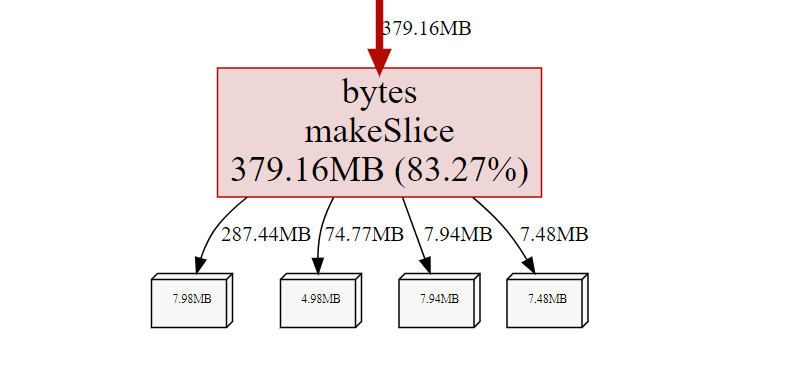Why golang allocated memory space increases?
147 views
Skip to first unread message
steve tang
Mar 25, 2020, 11:22:42 PM3/25/20
to golang-nuts
chunkCrc32Hash := crc32.NewIEEE()chunkBuf := bufferpool.GetInstance().Get()//回收bufferdefer bufferpool.GetInstance().Put(chunkBuf)writer := io.MultiWriter(chunkBuf, chunkCrc32Hash)_, copyErr := io.Copy(writer, chunkResp.RawResponse.Body)if copyErr != nil && copyErr != io.EOF { logmgr.ErrorLogger(ctx, "fail to write chunk data to crc32 or buffer, req: %s, err: %s", originReq.PrettyPrint(), copyErr) return false, exception.OEFException(nil, http.StatusInternalServerError, CopyChunkError, "internal server exception")}In above codes, it writes chunk data to buffer pool, and the chunk data size is 4MB. When I used golang tool pprof to export memory pprof, there about 8MB space has been allocated. Could somebody help me why golang allocated memory space increases?

robert engels
Mar 26, 2020, 12:22:01 AM3/26/20
to steve tang, golang-nuts
If the pool is a sync.Pool:
Any item stored in the Pool may be removed automatically at any time without 18 // notification. If the Pool holds the only reference when this happens, the 19 // item might be deallocated.
So placing an object in the pool does not guarantee it won’t be collected - causing a future allocation.
<20200326-111844.png>
--
You received this message because you are subscribed to the Google Groups "golang-nuts" group.
To unsubscribe from this group and stop receiving emails from it, send an email to golang-nuts...@googlegroups.com.
To view this discussion on the web visit https://groups.google.com/d/msgid/golang-nuts/6dbe93e6-9bb7-4112-87cb-085e68d9d393%40googlegroups.com.
<20200326-111844.png>
steve tang
Mar 26, 2020, 2:58:59 AM3/26/20
to golang-nuts
Thanks, I used sync.Pool to allocate a byte.Buffer, and response.Body isn't constant size in program, I find golang will grow the byte.Buffer space against to initial space. I changed code as follows:
type SyncPool struct{ Pool sync.Pool }
func (s *SyncPool) Get(n int) []byte {
//比n大,不需要slice增长时,使用buffer pool
if b, ok := s.Pool.Get().([]byte); ok && cap(b) >= n {
return b[:n]
} else {
//miss size
s.Put(b)
return make([]byte, n)
}
}
func (s *SyncPool) Put(b []byte) {
s.Pool.Put(b)
}
const FourMB = 4 * 1024 * 1024
var pool = &SyncPool{
sync.Pool{
New: func() interface{} {
return make([]byte, FourMB)
},
},
}
On Thursday, March 26, 2020 at 12:22:01 PM UTC+8, robert engels wrote:
If the pool is a sync.Pool:Any item stored in the Pool may be removed automatically at any time without 18 // notification. If the Pool holds the only reference when this happens, the 19 // item might be deallocated.So placing an object in the pool does not guarantee it won’t be collected - causing a future allocation.
On Mar 25, 2020, at 10:22 PM, steve tang <tsg...@gmail.com> wrote:
<20200326-111844.png>
--
You received this message because you are subscribed to the Google Groups "golang-nuts" group.
To unsubscribe from this group and stop receiving emails from it, send an email to golan...@googlegroups.com.
Tamás Gulácsi
Mar 26, 2020, 4:51:05 AM3/26/20
to golang-nuts
1. sync.Pool MUST use pointers (*[]byte)
2. what is `chunkBuf := bufferpool.GetInstance().Get()` ? it must be an io.Writer, but you should Reset/Truncate it when you Put it back to the pool!
Jakob Borg
Mar 26, 2020, 6:35:20 AM3/26/20
to golang-nuts
On 26 Mar 2020, at 09:51, Tamás Gulácsi <tgula...@gmail.com> wrote:
sync.Pool MUST use pointers (*[]byte)
I've seen this a lot but I confess I don't understand it. A []byte is essentially a fat pointer, what does it matter if we put that or a *[]byte into the pool? I understand that putting a []byte will result in an allocation of a new []byte, but
probably the purpose is to preserve and avoid reallocating the backing array, which might be large.
Is there something fundamental about the sync.Pool that means that a put *must* be zero-allocation for it to function? Likely the calling code around the puts/gets are not zero-allocation either.
//jb
Henrik Johansson
Mar 26, 2020, 6:53:23 AM3/26/20
to Jakob Borg, golang-nuts
Isn't this because of the GC tracking these and treating then as effectively weak references to borrow a Java term?
If they are not pointers they are not tracked by the GC and I guess they could all be removed at every scan?
Just guessing though, I haven't in any way checked it.
--
You received this message because you are subscribed to the Google Groups "golang-nuts" group.
To unsubscribe from this group and stop receiving emails from it, send an email to golang-nuts...@googlegroups.com.
To view this discussion on the web visit https://groups.google.com/d/msgid/golang-nuts/DB9E8E73-10B0-451B-BE66-13AF2930BB74%40kastelo.net.
Reply all
Reply to author
Forward
0 new messages
